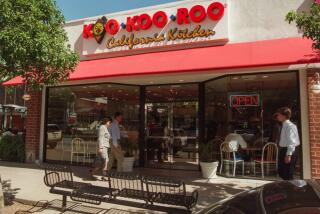Koo Koo Roo Loses Its Perch on the Nasdaq
- Share via
Koo Koo Roo Enterprises Inc. said Monday it is being delisted by Nasdaq for not meeting one of the market’s minimum requirements.
The Irvine-based company’s shares will begin trading today in the lower-profile over-the-counter market.
Koo Koo Roo, which operates several restaurant chains, said it failed to meet the $5 minimum trading price required of new companies. Although Koo Koo Roo Inc. shares traded for more than six years on Nasdaq, it became part of a new company--Koo Koo Roo Enterprises--when it was purchased last year by privately owned Family Restaurants Inc., parent of the El Torito Mexican food chain.
During the merger negotiations, the company said it was granted a waiver by a Nasdaq committee, essentially exempting it from the $5 requirement. But the waiver was rescinded after being considered by a higher Nasdaq panel.
In fact, the company was also failing to meet another standard--a minimum trading price of $1 a share for all companies--that Nasdaq established last year, one of a number of new restrictions. Delistings have more than doubled since the new restrictions took effect.
Trading in Koo Koo Roo shares was halted early Monday. At the time, the stock was trading at 59 cents, down 25 cents a share, from Friday’s closing price.
“We raised the bar,” Nasdaq spokesman Scott Peterson said Monday. “This is one way we’re attempting to protect shareholders.”
Koo Koo Roo said it was warned in December that it would also have to meet the $1 requirement. Nasdaq officials gave the company until March 31 to boost its share price to at least $1 for 10 consecutive trading days to avoid delisting, the company said.
Koo Koo Roo said it was putting together a plan to meet that standard when it learned Friday that a Nasdaq panel had overturned the waiver.
“It’s a disappointment,” said Robert L. Carl, vice president of investor relations. “It becomes a minor impediment for our shareholders to conveniently trade shares. As far as an operational setback, there’s none that we know of.”
Carl said the company had been optimistic that it would be able to meet the $1 requirement.
“We hit a dollar on Friday,” he said. “It settled back down, but we did peak at a dollar, and that was two months ahead” of the March deadline.
Experts say trading is generally more difficult for companies not listed on one of the three major markets--the New York Stock Exchange, the American Stock Exchange and Nasdaq. Brokers generally avoid such stocks and are less likely to recommended them, analysts say. Further, investment bankers are less interested in dealing with companies that lose their listings.
“You’re not going to have any brokerage house offering it to its clients or saying, ‘This is a good deal,’ ” said Janet Lowder, president of Restaurant Management Services, a Rancho Palos Verdes consulting firm.
Regarding Koo Koo Roo, Lowder said company officials should consider “a road show” to pump up the company and raise its visibility with the public and brokers.
The company could also be hampered by its name, she said, since it does not reflect the company’s broad holdings, which include more than 300 eateries in 28 states, including Chi-Chi’s, Hamburger Hamlet and Casa Gallardo chains.
“The name may be causing confusion for stock brokers and the public,” she said. “People may be looking at that and think it’s just a chicken place.”
On Monday, Koo Koo Roo said it is moving forward with its expansion plans, which include opening an undisclosed number of restaurants in California this year. Last month, the company hired three executives to direct its planned expansion throughout the state.
Since the merger, the company said, it has had no significant layoffs and has closed only a restaurant in Washington, D.C. Two new Koo Koo Roo restaurants opened recently, one in Valencia and the other in Monrovia.
“We have over 20,000 employees,” Carl said. “Whether we’re on the Nasdaq or over-the-counter Bulletin Board in no way changes our service strategy, our menus, our renovation programs or our new store roll-outs.”
More to Read
Inside the business of entertainment
The Wide Shot brings you news, analysis and insights on everything from streaming wars to production — and what it all means for the future.
You may occasionally receive promotional content from the Los Angeles Times.










